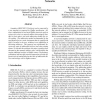Free Online Productivity Tools
i2Speak
i2Symbol
i2OCR
iTex2Img
iWeb2Print
iWeb2Shot
i2Type
iPdf2Split
iPdf2Merge
i2Bopomofo
i2Arabic
i2Style
i2Image
i2PDF
iLatex2Rtf
Sci2ools
113
click to vote
AINA
2008
IEEE
2008
IEEE
Flexible Address Configurations for Tree-Based ZigBee/IEEE 802.15.4 Wireless Networks
A number of IEEE 802.15.4 devices can be connected by a tree topology as proposed by ZigBee specification. Address configuration in tree-based ZigBee networks needs to assign every device a network address that uniquely identifies it from others, and such addressing should also assist routing. The addressing method recommended by the specification forces a static assignment that is coupled with node's location in the tree, resulting in an inflexibility in allocating addresses. This property may significantly decrease the ratio of addressable devices and cause routing detour. To alleviate the problem, this paper considers three alternatives that manage address space with flexibility but require additional storage in ZigBee routers. Performance evaluations indicate that proposed approaches provide different levels of tradeoff between the ratio of addressable devices and storage costs in ZigBee routers.
| Added | 12 Oct 2010 |
| Updated | 12 Oct 2010 |
| Type | Conference |
| Year | 2008 |
| Where | AINA |
| Authors | Li-Hsing Yen, Wei-Ting Tsai |
Comments (0)

